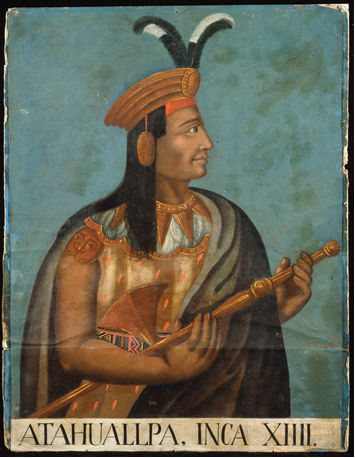Pig Caretaker
Francisco Pizarro was born in Castile (Spain) around 1475 and spent much of his childhood with his grandparents, where he likely helped to take care of the family’s pigs. In 1502, his career in ocean travel began when he accompanied the new governor to the Caribbean island of Hispaniola (modern Haiti and Dominican Republic), which was a Spanish colony. He next joined an expedition under the command of Alonso de Ojeda to Colombia, and three years later, joined explorer Vasco Nunez de Balboa on the expedition credited with the European discovery of the Pacific Ocean.
In Search of Incan Treasure
Pizarro made his first fortune after being named mayor of Panama from 1519-1523 by Pedrarias Davila. In 1523, the 48-year-old explorer voyaged along the west coast of South America through Ecuador and Peru (which he named) in search of the vast riches said to be within the Incan empire. The Incas were the largest pre-Columbian (before Columbus) empire in the Americas and ruled over much of western South America. Pizarro returned to Spain to ask permission to undertake the conquest of the lands they had discovered. His mission to conquer the Incas failed in 1524 and again in 1526. In 1530, Pizarro, now sponsored directly by King Charles I, sailed back to South America with four of his brothers and several other family members. Pizarro and his crew would establish the first Spanish settlement in Peru at San Miguel de Piura.
The Execution of Atahualpa
Hostilities between the Spanish conquistadors and the Incas erupted at the Battle of Cajamarca on November 16, 1532. During the battle, Pizarro and the Spaniards captured the Incan chief Atahualpa, after he refused to become a Spanish subject and convert to Christianity. Despite the fact that demands for Atahualpa’s release were met with an entire room full of gold, Pizarro ordered the chief’s execution for various "crimes." Pizarro then occupied and subjugated the royal capital of the Incan Empire, Cuzco.
 |
Incan Chief, Atahualpa |
Founding of Lima
Pizarro spent the rest of his life maintaining Spanish control of Peru and defending the vast wealth of his family. He founded the eventual Peruvian capital of Lima in 1535. Bitter about Pizarro receiving a larger share of the spoils from their expeditions, his own countrymen attacked his palace on June 26, 1541, and killed him.